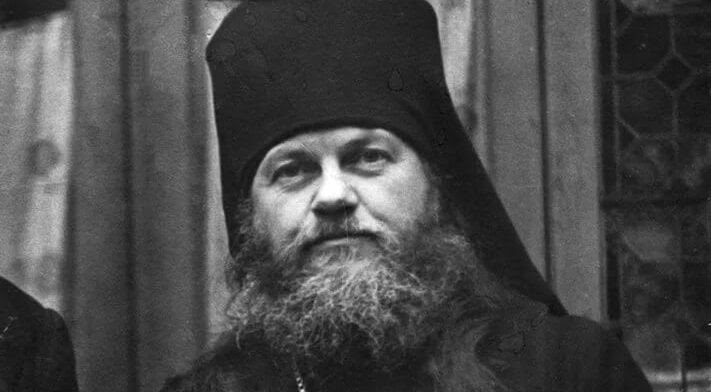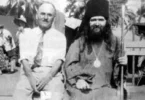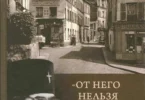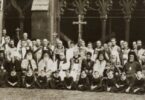Archbishop Nathanael L’vov passed away on this day in 1986.
On November 4, I wrote about Metropolitan Nestor (Anisimov), whose name-day is on November 9 (n.st.) Today, I am writing about Archbishop Nathanael, whom Vladyka Nestor tonsured a monk and ordained to all the clergy ranks, including presbyter.
The future archbishop was born into a noble family in Moscow in 1906. He belonged to the generation uprooted and traumatized by the Revolution and Civil War. His father was Ober-Procurator of the Most Holy Governing Synod under the Provisional Government and later an activist for the Renovationist movement.
In 1920, Vasilii (Vladyka Nathanael’s baptismal name), together with his mother and younger siblings, went to Harbin, where he completed his primary education. Archbishop Nathanael’s life was as fascinating as that of one of his mentors, Metropolitan Nestor. He smuggled literature in the USSR across the Amur River, assisted Pierre Teilhard de Chardin, S.J., in his expedition in Inner Mongolia, and served as a priest in Ceylon. In 1933, Metropolitan Anthony (Khrapovitskii) elevated Fr. Nathanael to the rank of the hegumen.
Like some other church figures from the first émigré generation, Archbishop Nathanael lacked formal theological education. He had three years of pastoral school in Harbin. However, this lack of formal education was compensated by his enormous erudition. In the 1990s, the Russian Orthodox Youth Committee in New York published five volumes of his articles collected by Bishop Hilarion of Manhattan. His discussion with Fr. Alexander Schmemann of the canonical organization of church life in the diaspora turned into an unexpectedly productive conversation.
Fr. Nathanael spent the war years in St. Job of Pochaev Monastery in Ladomirová in Slovakia editing monastery publication and writing for the Russian people on the terretories of the USSR occupied by Axis powers. He was excited to meet people who recently left Russia. After the end of World War II, Fr. Nathanael, together with another member of the Ladomirová Brotherhood, Fr. Vitaly (Ustinov), prevented the forced repatriation of the displaced persons to the USSR from Northern Germany.
Fr. Nathanael became a bishop in 1946 in Geneva. There were other episcopal consecrations of “Russian émigré youth” to counterbalance the influx of “outsider” bishops into the ROCOR. In 1953, due to a scandal surrounding his actions in 1949 while a vicar Bishop of the Western European Diocese, the Synod of Bishops retired Bishop Nathanael to St. Job of Pochaev Monastery in Munich. As with the divisive moral controversies of Byzantine times, not all ROCOR bishops were happy about the leniency of the Synod’s decision. However, with the benefit of hindsight, this decision does not look wrong. Archbishop Nathanael humbled himself, and the Russian people in Munich remember him as a good shepherd.
Relevant Links:
Bishop Nathanael, “On the Destiny of the Russian Church Abroad: A Response to Fr. Alexander Schmemann”.
Archbishop Nathanael, “Report to the Episcopal Conference Concerning Accusations of ROCOR Interference in the Affairs of the Church of Greece”.










